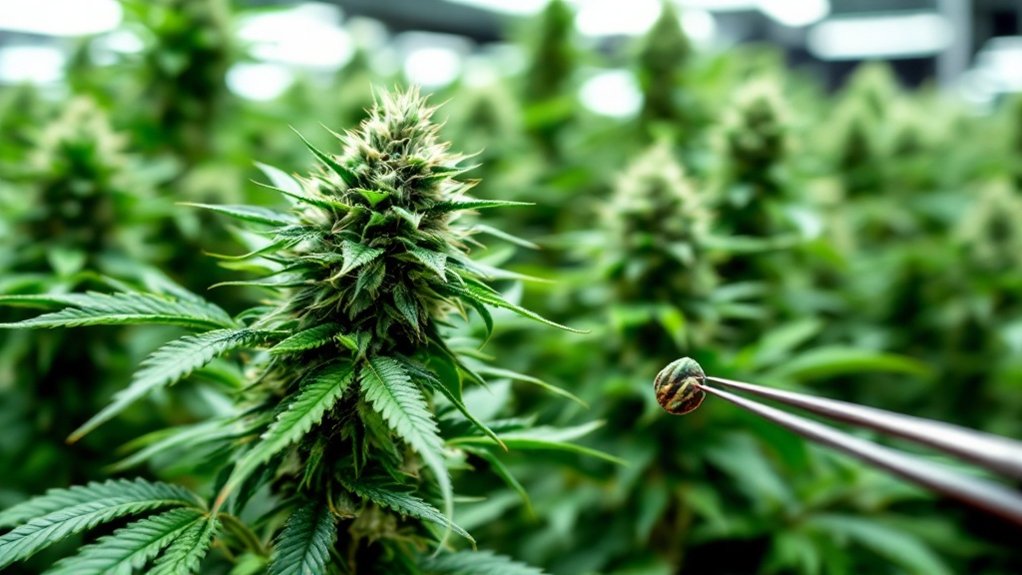Marijuana dispensary franchises present viable business opportunities in today’s cannabis market, projected to reach $45.35 billion by 2025. These franchise models provide entrepreneurs with established systems for maneuvering through complex regulations while leveraging brand recognition and operational guidance. The total economic impact of regulated cannabis sales is expected to hit $123.6 billion in 2025, creating favorable conditions despite regulatory challenges. Regional markets vary greatly, with Eastern U.S. states showing particular growth potential for investors seeking entry into this mainstream retail sector.

As the United States cannabis market continues its robust expansion toward a projected $45.35 billion by 2025, entrepreneurs increasingly view marijuana dispensary franchises as gateways into this flourishing industry. With the total economic impact of regulated marijuana sales expected to reach $123.6 billion in 2025, representing a 9% increase from the previous year, the cannabis sector offers considerable business opportunities despite persistent regulatory challenges.
The combination of direct medical and recreational sales, estimated at $35.3 billion, alongside an additional $88.3 billion contributed to the broader economy, creates a compelling case for investment in dispensary franchise models.
The cannabis landscape varies greatly across regions, creating diverse market conditions for potential franchisees. While Illinois has maintained its position as one of the country’s largest markets with over $2 billion in sales, western states like California and Colorado have experienced declining sales that only recently stabilized. This regional variation is noteworthy as Western US usage rates stand at 19%, significantly higher than other regions.
Eastern markets, including New York and Ohio, present significant growth opportunities as they have yet to reach their full potential. This regional variability necessitates carefully tailored franchise strategies that account for local regulatory frameworks and consumer preferences.
Consumer demographics reveal promising market dynamics, with 47% of Americans having tried marijuana and one in three women over age 21 consuming cannabis products. This widespread adoption, coupled with the industry’s substantial economic contribution of approximately $115.2 billion, indicates a mature consumer base for dispensary franchises. The growing popularity of pre-rolls, which saw an 11.89% sales increase in 2024, offers franchise owners a clear direction for inventory prioritization.
However, potential franchisees must navigate complex regulatory environments, as Congress failed to pass meaningful reform in 2024, and marijuana rescheduling remains on hold under the current administration.
The investment landscape presents both opportunities and challenges. While the industry continues its growth trajectory, explosive expansion appears unlikely in 2025 despite steady market development. Additionally, economic recession poses a potential destabilization risk to the cannabis industry, requiring franchisees to implement robust business strategies that can withstand market fluctuations.
Consumer pricing may also face pressures from potential tariffs, affecting dispensary profit margins and overall market dynamics.
Despite these challenges, the cannabis industry’s projected contribution of upward of $200 billion to the U.S. economy by 2030 indicates considerable long-term potential for dispensary franchises. With recreational marijuana now available in 24 states and newer markets like Minnesota preparing to open, franchise opportunities continue to emerge across the country, offering structured pathways into this expanding industry.
Frequently Asked Questions
How Do Cannabis Franchise Royalty Fees Compare to Traditional Retail Franchises?
Cannabis franchise royalty fees typically range around 4%, which is comparable to traditional retail franchises that charge between 4-7%.
While the percentage structures align, cannabis franchises provide specialized value through regulatory compliance guidance, established supply chain relationships in restricted markets, and operational templates for maneuvering complex state-specific regulations.
This additional expertise justifies the similar royalty rates despite the newer market status of cannabis brands compared to established retail franchises.
What Banking Solutions Exist for Marijuana Dispensary Franchise Operators?
Cannabis dispensary franchise operators can utilize several banking solutions despite federal restrictions.
ACH payments provide a compliant transaction method, while PIN debit systems offer legal card payment options.
Some financial institutions now provide specialized cannabis banking services with enhanced compliance protocols.
Cryptocurrency transactions are emerging as an alternative payment solution.
Financial technology companies are developing cannabis-specific payment platforms that comply with state regulations while mitigating federal concerns.
The SAFE Banking Act, if passed, would greatly expand banking access.
How Are Franchise Territories Determined in Limited-License Cannabis States?
In limited-license cannabis states, franchise territories are primarily determined using regulatory boundaries established by state licensing authorities.
Franchisors typically align territory definitions with license availability zones, often using county borders, municipal jurisdictions, or population-based metrics.
The scarcity of licenses creates natural territorial barriers, with franchisors conducting demographic and market penetration analyses to optimize territory allocations.
Many franchise agreements incorporate specific radius restrictions or zip code designations that reflect the unique regulatory constraints of each state’s cannabis program.
Can Existing Dispensaries Convert to Franchise Models?
Existing dispensaries can convert to franchise models through a process often called “conversion franchising.”
Dispensary owners typically pay franchise fees and commit to adopting standardized branding, operational procedures, and inventory management systems.
The shift process requires compliance with both franchise agreements and local cannabis regulations, which vary by jurisdiction.
Many independent operators pursue this change to gain brand recognition, marketing support, and established operational systems that potentially increase sales conversion rates and overall store performance.
What Intellectual Property Protections Exist for Cannabis Franchise Concepts?
Cannabis franchise concepts can access multiple intellectual property protections despite federal limitations.
Franchises can secure state-level trademark registrations for cannabis products where legal, while obtaining federal trademarks for ancillary goods and services.
Copyright protection extends to franchise manuals, marketing materials, and brand elements regardless of cannabis’s federal status.
Trade secret protection safeguards proprietary cultivation methods, formulations, and operational systems.
Patent protection may be available for unique cannabis-related innovations, though requiring careful navigation of federal law.









